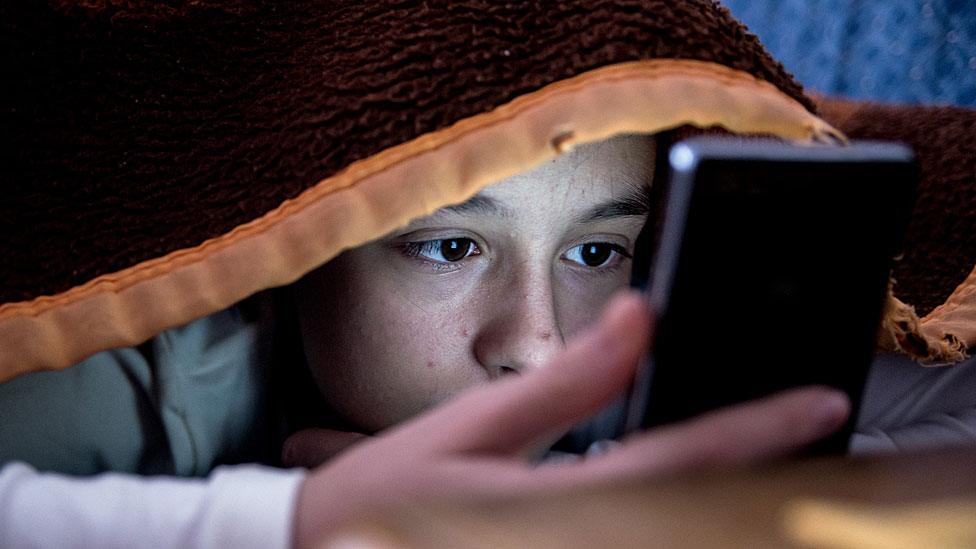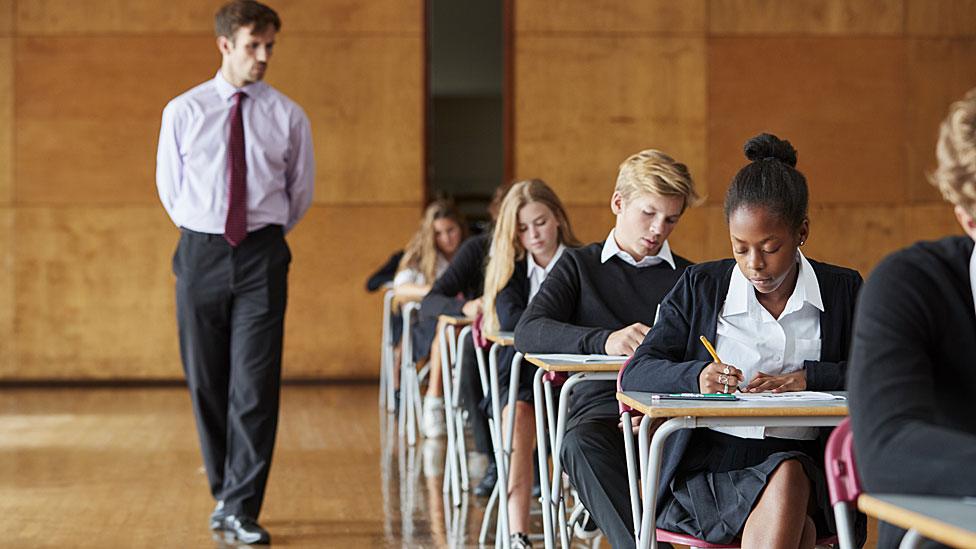Can you really revise while chatting online?
- Published
- comments

Can you really revise for exams at the same time as conducting multiple simultaneous conversations on social media?
Have teenagers really developed such skills of multi-tasking that they can respond to Snapchat, WhatsApp and Instagram, answer texts, and watch funny videos of pets on YouTube, at the same time as studying?
It's peak season for revision for exams in schools and universities, and parents will be trying to give their own advice, confident in the knowledge that whatever they say is likely to start an argument.
And high on the list of easy ways to get a door slammed in your face is to suggest, ever so carefully, that they should just switch off the mobile phone for five minutes and focus on the text books.
'Myth' of multi-tasking
But are young people really able to respond to so many different stimulations at the same time? Wouldn't Pavlov's dog be dead with exhaustion if it had to keep responding like this?

Young people are showing "addictive behaviour" when it comes to using smartphones
Tom Bennett, a teacher, parent and the UK government's adviser on behaviour in school, says it's a complete "myth" that teenagers can multi-task between social media and online entertainment and still keep studying.
Mr Bennett is the director and founder of the ResearchEd group, which spreads education research among the teaching profession, and he says all the evidence points to online distractions harming learning.
Revision needs focus and concentration, he says, but this is going to be scuppered by the relentless, attention-seeking demands of social media.
"It's a very serious concern for educators and parents," he says.
Teenagers can have an "addictive response" to smartphones, says Mr Bennett, constantly checking for updates and responses.
Phone bans
Schoolwork is one casualty, alongside disrupted sleep and anxiety from an online culture that never switches off, says Mr Bennett.
"The children affected most are already likely to be the furthest behind," he says.

It's peak revision season - but can students avoid the distractions as they work on their laptops
There is international research to back his concerns.
A study of pupils in the Boston area, carried out by a research team including academics from the Massachusetts Institute of Technology, found "a link between greater media multi-tasking and worse academic outcomes in adolescents".
US academics also found similar results when they looked at achievement in schools in England that had banned mobile phones and so created at least part of the day away from messaging and social media.
Louis Philippe Beland, from Louisiana State University, and Richard Murphy, from the University of Texas at Austin, concluded that "not only does pupil achievement improve as a result of a ban, but also that low achieving and low income pupils gain the most".
An earlier study at Stanford University indicated that bombarding people with multiple online distractions didn't make them quicker to react, it made them less productive and lowered performance in memory tests.
'Don't just tell them to turn off'
But is that going to make any impression on a tech-addicted teenager who would need to be surgically detached from their mobile?
Part of the problem is that when a student is revising online, work and play are a click away from each other.

Tensions will be rising as the summer exams are approaching
Social media is waiting on the same screen as the revision. The playground and library are in the same place.
YouTube might be a soundtrack for putting off working, but it must also be one of the biggest unofficial revision services on the planet.
Google can be a starting point for websites stuffed full of free educational materials and online tutorials.
Dr Sandra Leaton Gray, senior lecturer in education at the UCL Institute of Education, says it's a mistake for parents to barge in and just say "turn it off".
"The clever way round it is to say, 'How are things going online?' Ask them if they're being distracted," she says, suggesting that teenagers need to be cajoled rather than confronted with the dangers of online time-wasting.
'Evil and wonderful'
They might be mixing up chat about exam revision with socialising, she says, so it's not always a clear separation between studying and responding to the next social media message.
But she also sees the constant diet of social media as adding to stress, rather than offering a relaxation during the exams.
She likens it to a "fast-food mentality", with an instant reward and then a longer-term sense of "dissatisfaction" and pressure from having to fit in with the "tribalism" of other teenagers.
This online culture is both "evil and wonderful at the same time" for teenagers, says Dr Leaton Gray.
But media habits have changed. An annual report this year indicated how much of children's media time was now spent alone and through a computer device.
Tom Bennett says parents are still trying to catch up with such changes.
But he says there is a growing awareness of the problems of too much time spent online - which is brought into sharper focus during the high-pressure weeks approaching exams.
"Maybe we're reaching a turning point," he says.

More from Global education
The editor of Global education is sean.coughlan@bbc.co.uk
